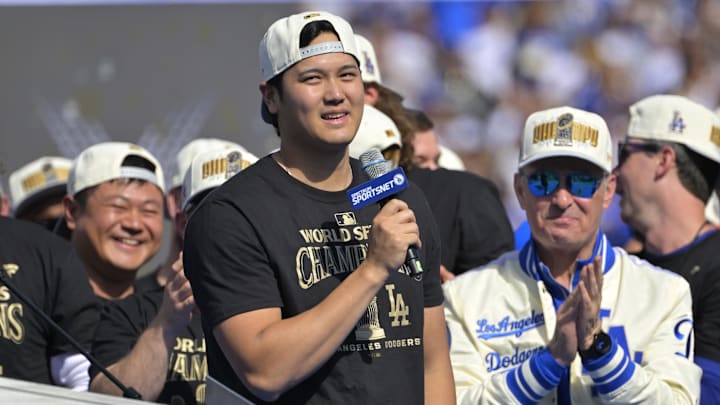First off: Happy Thanksgiving, baseball fans! This is a time to appreciate good company and food, and to share our gratitudes with those we love.
For most of us, baseball is one of the things that we love. Fandom gives and takes, but it's always a reprieve to have "our" teams (mostly).
Late on Tuesday night, the Dodgers gave their fans something to be thankful for: a massive free agent signing.
Left-hander Blake Snell and the Los Angeles Dodgers are in agreement on a five-year, $182 million contract, pending physical, sources tell me and @jorgecastillo. The World Series champions get the two-time Cy Young winner in the first nine-figure deal of the winter.
— Jeff Passan (@JeffPassan) November 27, 2024
The reaction to this news has mostly been negative across the baseball sphere. The Dodgers were already baseball's best team, were expected to return Shohei Ohtani, Tyler Glasnow, and others to the pitching mound in 2025, and were already top-five in payroll allocations for next season. The "rich getting richer" adage doesn't even really begin to describe what this move feels like as a fan of any of the other 29 teams in the sport.
Still, the Dodgers sort of needed to make a move for a starting pitcher, insofar as a team as loaded as they are has any "needs".
The Dodgers' innings leaders over the last 3 seasons are Julio Urias, who didn't play last year or for much of 2023, and Clayton Kershaw, who pitched 30 innings this season. pic.twitter.com/xOIPu9dmFZ
— Brad (@ballskwok) November 27, 2024
The most concerning element of Snell's signing is that the Dodgers, yet again, utilized "payment deferrals" as a means of lowering the present-day value of a contract. In simple economics terms, deferrals (i.e., the practice of delaying a portion of a payment until a later date) are worth less than payments made now because of inflation — over time, inflation decreases the value of the dollar, meaning that $32 million today may be worth the equivalent of $32.5 million in five years.
The Dodgers have been abusing this practice for a while, though the national media really started paying attention to it last year, when they famously signed Ohtani to a $700 million contract that has significant deferrals.
Deferring money limits the impact of player's contracts on both the team's present-day payroll and, more crucially, their luxury tax calculations. As the second biggest team in baseball, both in terms of popularity and revenue, the Dodgers don't need the advantage they've created from this practice.
It all begs the question: will baseball do anything about it?
Baseball doesn't need a salary cap, but deferred money is becoming a problem
“Article XVI – Deferred Compensation” of the CBA states: "There shall be no limitations on either the amount of the deferred compensation or the percentage of total compensation attributable to deferred compensation for which a Uniform Player’s Contract may provide."
There have been some famous deferred contracts in history — Bobby Bonilla, anyone? — but they've often been one-off deals with unique circumstances.
The Dodgers, meanwhile, are using this tool as a monetary weapon. It's sort of ironic that spending money is becoming the new "Moneyball" tactic, but such is the nature of a sport with billionaire owners that don't want to spend.
To be sure, the bill always comes due. Ohtani is getting paid only $2 million per season for the length of his decade-long contract, but then the Dodgers will be on the hook for a $68 million check every year from 2034-43. It'll pose some logistical problems in the future, but it makes the Dodgers nearly impossible to outbid in the present. For a sport that takes so much pride in its parity, Los Angeles is making a mockery of the "free market".
Some have wondered what this will mean when the CBA expires at the conclusion of the 2026 season. Last time a new deal needed to be negotiated, there was an ugly lockout that lasted until the start of spring training.
It's hard to say if this practice will lead to another lockout in a couple of years, but you can be sure that the idea of a salary cap won't be introduced. A lot of players may not like the idea of delaying payments for a decade or more, but all of them hate the concept of artificially limiting what their employers can spend.
Still, this problem obviously needs to be addressed. Article XVI will need to be amended in some fashion to limit how much money teams can defer to keep competitive balance stable; perhaps small-market teams will be able to defer a larger percentage of contracts than titans like the Yankees or Dodgers.
Regardless of what changes are made, though, fans have to keep in mind that players can choose where they want to play. Even if a new CBA clause limits how much deep-pocketed juggernauts can spend, players will naturally flock to big markets and competitive teams. Most have geographic preferences for the West or East Coast, too.
To put it simply: even if baseball stops the Dodgers from deferring hundreds of millions of dollars, that doesn't mean the Dodgers will stop signing the best players. They are inevitable.
